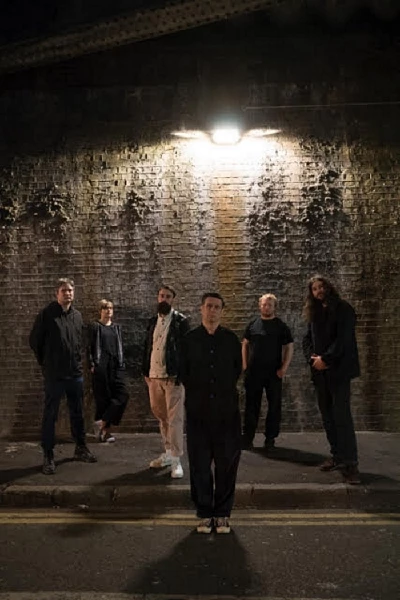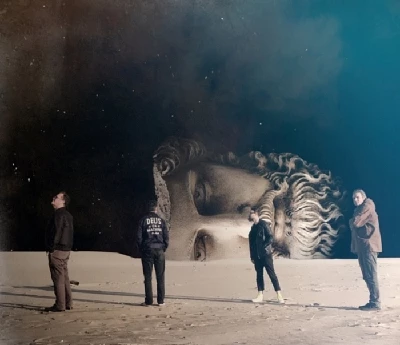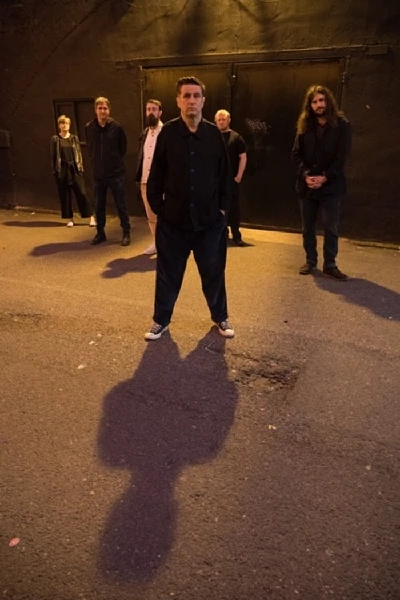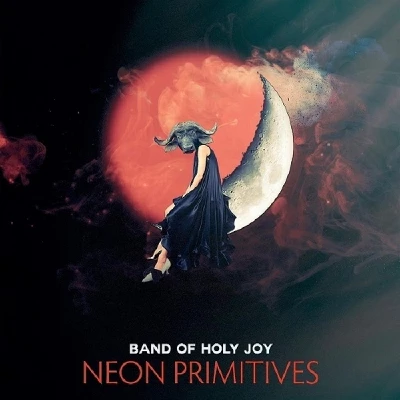published: 6 /
8 /
2019
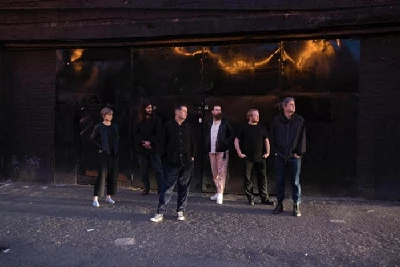
In our fifth interview with them, John Clarkson talks to Johny Brown, Inga Tillere and James Stephen Finn from London-based alternative/indie rock band the Band of Holy Joy about their remarkable latest album, ‘Neon Primitives’.
Article
“If a picture is posted on Instagram and no one likes it, does it exist? The age of digital insatiability. Cacophony of words and images. Hour by hour. All day every day. ‘Be your dream, now or ever’; 3 likes 2 hours ago. ‘Merlin and Mediva had gone missing last week. After consulting with the client yesterday both cats found their way home early this morning’; 40 likes 4 hours ago, West Oakland, Oakland, California. ‘2am chip thx’; 6 hours ago, Old Street Station. ‘I think I poetically figured out how to tell someone they are a Fat C*nt. Thou art an obese cavernous region of a woman’s loins’; 19 likes 7 hours ago. ‘Getting drenched at a Slightly Stoopid concert & having to stop by a gas station to dry off and pee is always a reason to snap a photo to remember the occasion’; 355 likes 1 day ago. ‘I left a light on ... – Universe’; 78 likes June 27. Endless narcissistic noise. Where does it all go after briefly appearing on our screens? In a year, ten years, twenty years, hundred years, where will this digital noise be? Who will look at it, read it? ‘Neon Primitives’ is everything that isn’t this.” INGA TILLERE (VISUALS, COLLAGE, COVER DESIGN)
“It is a form of higher being, a form of higher consciousness maybe. It is people who are in the dark and looking for the light.” JOHNY BROWN (VOCALS)
“I envision these people who in these strange, difficult times still manage to shine through. The album has lots of themes of light and dark, and then there are these characters we meet throughout who are trying to navigate this world. In the end there’s this optimistic sense that they’re finding their way out of the darkness as they sail to the island of light.” JAMES STEPHEN FINN (GUITARS, PIANO, BACKING VOCALS)
In our fifth interview with them, Pennyblackmusic is talking to the London-based alternative/indie rock act the Band of Holy Joy’s longest-term members Johny Brown, his partner Inga Tillere and James Stephen Finn about their new album ‘Neon Primitives’, and what its title means to them.
There is a unity of thought, but as might be expected from such an experimental, boldly inventive group based firmly around its individual members each of them, all of whom are speaking separately to Pennyblackmusic, also has their own slant on it.
First formed in 1983 by Brown in a New Cross squat, the Band of Holy Joy has released approximately thirty albums, some on limited edition CDRs and cassettes of less than 100 usually on its own Radio Joy label, and over fifteen more “official” releases on labels that have included Rough Trade, Cherry Red, Exotic Pylon, Moloko Plus, Stereogram Recordings and most recently Tiny Global Productions.
A multi-media concern, in which Tillere ‘s stunning visuals and sleeve designs have a dominant role, the Band of Holy Joy’s gigs are enflamed, life-affirming experiences. They are also involved in performance art, provide soundtracks to established playwright Brown’s plays, are film-makers and have their own radio show ‘Band Punk’, which transmits on Friday nights on the London indie station Resonance FM.
The group has had over forty members over the years, but in recent times has stabilised to, as well as Brown, Tillere and Finn, include Mark Beazley (bass, guitar, backing vocals) and Peter Smith (organ, synthesizers, backing vocals).
‘Neon Primitives’ is the second in a proposed trilogy that reflects on an ever divisive Britain, shredded at its seams by Brexit. While it is Brown who has written the lyrics, it is an issue that has particular impact on Tillere, who despite being Latvian-born has lived in London for the past two decades.
The central tracks on ‘Funambulist We Love You’, the 2017 predecessor to ‘Neon Primitives’, included the epic ‘To Leave or Remain’, which took a failing relationship as an allegory for the bigger theme of Brexit, and ‘The Song of Casual Indifference’, in which Brown blamed the arrogance and the apathy of British voters for allowing it to happen.
‘Neon Primitives’ builds on this further. Part political statement, part reflection on social injustice and part flight into magical realism, it is an album of two halves, one half dark and despairing, the other looking for something more positive and concluding on a note of hope.
It opens with the scorched, brief balladry of ‘Lost in the Night’ (“Lost in the night/Never quite sure to turn/Wrong or right”), before opening out into the powerful ‘The Devil Has a Hold on the Land’, in which against a stabbing, dancing punk rhythm, Brown lists some of those who have led to Britain’s structural collapse (“Those good at misleading not too good at explaining/Who would hold our health in our hands/And sell our coughs for laughs”). Next there is a cover of Vincent Gallo’s torch song ballad, ‘So Sad’. The melancholic folk pop of ‘Ecstasy Snowbirds’ meanwhile tells of a couple who escape the rat race to live in isolation in the country, but who soon fall apart through their own failings (“No one knew or cared we were there/We were hidden from society bother to none/Until I messed up and you wanted me gone”).
‘Some People Have Winged Fortunes’ focuses on luck, how some people have plenty of it and others struggle seemingly forever to get out of a rut (“You see their scars/On nervous arms like the gnarled stem of the lovely rose/With unseen root dragging them forever down.”) The abrasive call-to-arms ‘Urban Pagans’ (“When it’s dark it’s dark/When it’s dark we will turn and we’ll embrace a different light”) and light funk of ‘Electric Pilgrims’ (“I’m almost there/Almost fractured almost there”), however, begin to find a way forward, while on the last track, waltzing sea shanty ‘We are Sailing to the Island of Light’ Brown imagines all the misfits of the world escaping the horrors of the urban world and forming their own paradise (“Now that we know who we are/We must all stick together out there/Come on you blessed outsider old timers/Hoist that tattered queer flag now…”).
“The album has got a complimentary flow and a narrative,” Johny Brown explains, taking Pennyblackmuisc through a detailed track-by-track breakdown of the songs on ‘Neon Primitives’. “It starts with ‘Lost in the Night’. You don’t know whether to turn left or right, what’s wrong or right. You don’t know what to do, and then you are looking around you and you see that ‘The Devil has a Hold of the Land’. and so you move on and you feel really sad. You have got all these negative feelings. You’re depressed and on pills. You’re rattling around, and then next there is a song about a couple of lovers finding isolation in nature. You’re looking at new ways of living, alternative ways of living, and that doesn’t work out either and that messes up.”
“Then there is this song about chance and faith and desire, and how some people are born with winged fortune and some people are born to lose. Some people can’t help mess up. Some people are always looking for happiness, and from there it is a breakthrough moment. You have got ‘Urban Pagans’ and things are still dark, but you know can push forward and make a better life. You know that there are better people around you. You reach out for your fellow humans, and build a little band around you, a team of like-minded people and then you are almost there in ‘Electric Pilgrims’. You know that there are obstacles in the way, all these lets downs, things pulling you back, but you are almost there. It is like when you are starting out in life, when you are fourteen or fifteen, when you have got that spirit of rock and roll or punk rock, when you had that spirit inside you of you were going to do something one day, and you find that wisdom now. It used to be in books and records, and now it is in your soul and with that ‘We Are Sailing to the Island of Light’. Come on! We are off. We are going to take all the weirdos. We are going to take all the freaks and we are going to take all the outsiders. Forget the fascists! Forget the straights! Forget the racist taxi drivers! Forget the people who are depressing you! There is still scope for that libertarian outlook.”
In conversation with Johny Brown, Inga Tillere and James Stephen Finn, they provided further insight into ‘Neon Primitives’.
PB: It has been suggested in your press release that the Band of Holy Joy works best in times of turbulence. We are living in a very strange, difficult period and the Band of Holy Joy is going through an especially productive period. Would you agree with the press release?
JOHNY BROWN: There may be a point there. We are reacting against a lot of things, and we do seem to be very creative at the moment.
JAMES STEPHEN FINN: Politically and culturally we are living in strange times. Everything seems to be up in the air, and nobody really knows where we’re heading. I think all this ambiguity has caused people to take strong ideological stances to give them a sense of certainty, and the effect is greater tension between political and cultural groups.
Of course, there is plenty for there to be drawn on and Johny is masterful with how he manages to comment on such matters in his writing. But he has been incredibly prolific the whole time I’ve known him and this band has always been highly productive in its output.
INGA TILLERE: Since I have known Johny, he has been a prolific writer and is always working on something, often more than one project at a time. Sadly I cannot say the same about me. Since the Brexit referendum I have been rather depressed. It was a shock to discover that seemingly so many people dislike, even hate us Europeans. That was a hard blow after living in London for twenty years and thinking I am contributing to the life of this country just like everyone else. As this uncertainty continues, I have found it extremely hard to focus on anything creative.
JAMES STEPHEN FINN: We aim to record an album a year which we’ve been pretty successful with, but in between there are limited CDR releases, plays and performance pieces, and, of course, the weekly radio show.
Perhaps why the band can gain more attention in times like these is because Johny’s writing is very observational and does reflect the times we’re living in.
PB: James, you’re the longest-serving member of the group after Johny and Inga, neither of whom perhaps would describe themselves as musicians. Other musicians have come and gone, but you have been there nearly nine years and since ‘How to Kill a Butterfly’. Why do you think you have achieved such longevity in the band?
JAMES STEPHEN FINN: It might be that for the past few albums I’ve contributed a fair bit to songwriting - musically, definitely not lyrically as that’s completely Johny’s domain.
But more than that, this is a band that is constantly evolving and changing in sound, and looking to always improve and create. And that suits me perfectly as I’m very much of the same mind set.
There is something intrinsically Holy Joy is everything the band does. Which I’m sure is largely because Johny has always been driving the vehicle, and partly because we do honour and play the old songs which probably has some sort of unconscious effect on the band. But each record has its own sound with no two songs the same or too similar. And I’m totally on board with this. I’m not interested in making the same record twice. There’s too much out there to draw on.
Possibly the other aspect to the band that has made me a good fit is that it’s much more than just a touring and recording garage band. There’s the performance art, the plays, the radio shows and all the various art projects we’ve collaborated on other the years as a collective. I have a background in sound art, design and theatre so for the band to expand out into these other forms is comfortable for me, and it’s been a privilege to have a platform to work in all these different mediums in a variety of roles.
PB: A lot of critics and fans see ‘The Devil Has a Hold on the Land’ as being one of the Band of Holy Joy’s outstanding moments. Did it seem particularly special when you recorded it? How was that song written?
JAMES STEPHEN FINN: It definitely has an energy to it which I think comes a lot from the way it was written and recorded. ‘The Devil Has a Hold on the Land’ and ‘Urban Pagans’ are unique as they’re both songs that were created organically from jamming out in the rehearsal room as a band. Whereas usually the songs are written first and then brought into the rehearsal room or recording studio to be worked on.
JOHNY BROWN: We didn’t really write it. We were in the rehearsal room and a riff came out, and the whole band started playing, and I had this idea in my head about the devil having a hold on the land and these lyrics too about artificial intelligence and corporatism and over-priced hotels. I had all these thoughts going through my head about society being devalued. I just came out with the lyrics and that was really it. A lot of songs we just sit down and coax them over time, but it was the same with ‘Urban Pagans’. Both those songs suddenly appeared in the rehearsal room out of nowhere.
JAMES STEPHEN FINN: ‘The Devil Has a Hold on the Land’ felt very much like a song that just appeared out of thin air, and, despite having only played it through a couple of times, we decided to put it down as a live take in the studio even though we hadn’t really figured out the arrangement properly or how it was going to end. Those things just sort of came about and figured themselves out as we played it. There was overdubbing of vocals and guitars done after the fact, but that aggressive, punk energy from that initial performance is still there and it may not have turned out that way if we had considered and rehearsed it more before stepping into the live room. The end guitar solo was recorded during that initial performance and was a completely spontaneous thing - I don’t think I could have captured that same wild spirit with another take.
INGA TILLERE: Often it feels like we are moving backwards in time, becoming more intolerant, narrow minded. Men in power dictate what women can or cannot do with their bodies, same sex relationships are criminalised, religion is used to excuse all sorts of intolerance… And here we are – electing Trump and applauding Farage. For sure, we have contemporary tools, iPhones and Instagram, but perhaps that is the only change and we merrily carry on like Andersen’s Emperor in fancy new clothes.
JAMES STEPHEN FINN: I’m particularly proud of ‘Ecstasy Snowbirds’ as well. It’s storytelling takes the listener on a journey, lyrically and through how the music develops. There’s an instrumental section two thirds into the song where these minimal guitars and bass are soaked in reverbs which I find very pleasing. Part of the fun when Mark Beazley and myself mixed the album was playing around with different reverbs and compressors, but the guitar effects on that particular song were all tracked using my pedalboard.
The tune off the new album that I most enjoy playing live though is ‘We are Sailing to the Island of Light’. It’s one that Peter and Johny wrote and it’s like a warped sea-shanty, with a sing-along chorus and it’s great when the audience does.
PB: Who is in the Band of Holy at the moment? There have been changes in the line-up since ‘Neon Primitives’ was recorded. Mark Beazley has recently left, and Steve Hands who played drums on it was a ‘guest musician’.
JOHNY BROWN : We have got a new drummer, Daryl Holley,who was in Morton Valence. He is the best drummer I have ever worked with, and he is the nicest guy that I have ever worked with.
Mat Erik Hart is our new bassist. He is our engineer at Bad Punk and he is also a bass player. He has gone has to Japan for a couple of months. We are about to start recording a new album, so he won’t be playing on that but we are going to start playing shows again in October and November and he will be at those.
Mark Beazley is focusing on his other project Rothko, but he is still very much part of the Band of Holy Joy. He doesn’t want to play live anymore. He doesn’t enjoy being on stage, being on tour, being in the back of a touring bus, so he has stepped down but when it comes to producing this next record Mark will be right in the mix.
PB: This forthcoming next album is the last in the trilogy. It may be too early to say but in what ways do you see it differing and what do you see it as having in common with its two predecessors?
JOHNY BROWN: We have got about ten songs. It is a good start, but James and I are just sketching out at the moment. We probably need about twenty, and then we will pick about ten of them out of them.
JAMES STEPHEN FINN: It is too early to say just what this new album will be like as the stage we’re still in the early stages of figuring out song structures between Johny and myself with the two of us emailing demo recordings back and forth. It’s only once we get the rest of the band in the studio and adding their own personality to the tracks that we’ll start to see a sound shaping up and the songs coming alive.
JOHNY BROWN: It will definitely be post the Island of Light. There is going to be a lot about love and self-healing and self-help, a lot about those concerns.
PB: Do you reject lots of material?
JOHNY BROWN: Yes. We reject stuff, but at the same time we release the CDRs to fund the album and come September and October there is going to be room on those for songs and material that doesn’t make the main album.
I have got some great titles which I have collected from books for those already. They will definitely be experimental, and they are definitely going to feature some electronic stuff. I am hoping to do some with just me and a guitar, some really personal songs, and I am hoping that James is going to come up with some soundscapes as well, that we are going to do some trash aesthetic material taking sound samples off YouTube and the computer and putting that into soundscapes.
PB: What are your plans beyond that?
JOHNY BROWN: There will be another album after that but I don’t feel that it will be in the same vein as these ones. The plan is at the moment just to work. As you get older you feel it more keenly. I just want to sing better and to give better performances. I feel that when we go on stage now you mean business, and that stage is yours for forty-five minutes and you make the most of it. I am just feeling that more and more. I have a craft and I want to make the most of it, and I know that the rest of the group feel the same. We will get this next album done and take things from there.
PB: Thank you.
Photography by Jo Joelson
Band Links:-
http://www.bandofholyjoy.co.uk/
https://www.facebook.com/bandofholyjoy
https://twitter.com/BandOfHolyJoy
https://bandofholyjoy.bandcamp.com/
Play in YouTube:-
Picture Gallery:-
